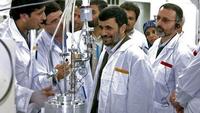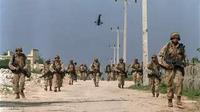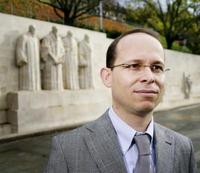-
Appeals Court blocks Arizona’s order denying driver’s licenses to “dreamers”
A three-judge panel of the Ninth U.S. Circuit Court of Appeals has blocked an August 2012 executive order issued by Arizona’s Republican governor Jan Brewer which denies driver’s licenses and other public benefits to young immigrants who are allowed to remain in the United States under a 2012 Obama administration policy.
-
-
NSA, FBI monitored e-mails of prominent Muslim American leaders, attorneys
The NSA and FBI monitored the e-mails of prominent Muslim American leaders and attorneys, including the head of the largest American Muslim civil rights group, The Intercept reported yesterday. Critics of the surveillance programs of the NSA and other government agencies said the revelations proved their contention that these programs should be more closely monitored. The critics say that in order to obtain FISA court approval for the surveillance, the government alleged that these activists were agents of foreign powers. The critics also note that the monitoring of lawyers’ e-mails raises concerns that some of the information collected may be protected by the attorney-client privilege, which the intelligence agencies are bound to respect.
-
-
Iran wants to expand its uranium enrichment capacity

Iran’s Supreme Leader Ayatollah Ali Khamenei said on Tuesday that Iran would need significantly to increase its uranium enrichment capacity for future energy needs, dealing a setback to negotiations between the country and world powers.
-
-
Israel launches Operation Solid Rock against Hamas (updated)
The Israeli government has launched Operation Solid Rock, authorizing the calling up 40,000 reservists as it prepares for a long campaign against Hamas, a campaign which may include land incursions into the Gaza Strip. About 10,000 are being called right away, and they will be sent to Israel’s borders in the east and north, allowing army units now stationed there to move south to engage Hamas in the south. The calling up of 10,000 reservists – about four brigades – indicates that, at this stage at least, Israel contemplates a relatively limited ground operation in Gaza. Militants in Gaza have, in the last three days, been launching nearly 100 missiles and rockets a day at Israeli cities and towns in the south of Israel, for a total of 246 missiles and rockets so far. Most of these rockets fell in empty fields. Forty-six missiles (about 27 percent of the total) were heading toward populated areas, and the IDF’s Iron Domes defense system intercepted forty of them, a 97 percent interception success rate. Six missiles managed to go through the defensive system and exploded in populated areas. During the day Tuesday, the night between Tuesday and Wednesday, and earlier this morning, the IDF has intensified its retaliatory strikes against Hamas and Islamic Jihad targets, attacking and destroying more than 450 targets across the Gaza Strip. The Israel Air Force (IAF) says that so far it has dropped more than 400 tons of explosives on targets in the Gaza Strip. The IAF says that the damage it has so far inflicted on the Gaza strip in the first two days of the current operation is greater than the damage inflicted in the eight days of Operation Pillar of Cloud (14-22 November 2012).
-
-
Game of marbles inspires nuclear-inspection protocol

Modern cryptography combined with simple radiation detectors could allow nuclear-weapons checks to be carried out with almost complete security. That is the conclusion of scientists in the United States, who have used computer simulations to show how a beam of neutrons can establish the authenticity of a nuclear warhead without revealing any information about that weapon’s composition or design.
-
-
Engineering nuclear nonproliferation

University of Virginia engineering professor Houston Wood’s career demonstrates the important role that engineers can play in making the world a safer place. For more than two decades, Wood has helped governments determine whether nuclear programs in other parts of the world are being dedicated to peaceful or military purposes. In recent years, Wood has been working to determine the break-out time that Iran would require to develop a nuclear weapon if it stopped allowing the International Atomic Energy Agency IAEA) to inspect its nuclear facilities.
-
-
Seattle builds resiliency in the face of changing climate
The federal government’s National Climate Assessment, released in May, detailed the region-by-region effects which includes water shortages, sea-level rise, and more frequent wildfires. Most American cities fall short on climate change preparation when compared to several major cities around the world. A survey conducted by MIT reported that globally, “the U.S. has the lowest percentage of cities engaged in (climate change) assessments and planning.” Seattle has decided it needs to act, and act now, to make itself more resilient in the face of a changing climate.
-
-
Pentagon should use reduced budget to prepare for "great power conflict": study
As sequestration takes toll on the Pentagon’s budget, Defense officials must decide how to maintain superior military capabilities. A new study suggests that the Pentagon should focus more on a “great power conflict,” reflective of a newly aggressive Russia and rapidly modernizing China. Such an approach would force the department to modernize its current infrastructure and invest significantly in technological advantages at the expense of unlikely-to-be used ships, aircrafts, and soldiers.
-
-
Supreme Court cites NIST guidelines in ruling on cell phone searches
As digital technology transforms twenty-first century life, questions about privacy rights abound. The U.S. Supreme Court ruled on one such question in late June: if you are arrested, can the police search your cell phone without first obtaining a warrant? No, according to the 25 June 2014 ruling in Riley v. California. “Modern cell phones are not just another technological convenience. With all they contain and all they may reveal, they hold for many Americans ‘the privacies of life,’ … The fact that technology now allows an individual to carry such information in his hand does not make the information any less worthy of the protection for which the Founders fought,” Chief Justice John Roberts wrote for the majority.
-
-
Efforts to discourage unaccompanied minors from entering U.S. have so far failed
The administration’s efforts to discourage children from Central America and Mexico from illegally entering the United States continue to gain little traction, and the number of migrants under eighteen years old illegally crossing the U.S-Mexico border continues to increase. Officials blame the surge in young migrants on the William Wilberforce Trafficking Victims Protection Reauthorization Act, a 2008 law which made it difficult to repatriate unaccompanied minors without letting then appear before an immigration judge. The administration has asked Congress to change the 2008 law to give DHS greater discretion in repatriating Central American children more quickly, but some Senate Democrats have vowed to block narrow changes to immigration laws.
-
-
License plate readers still to reach their full potential
Systems which automatically read automobile license plates have the potential to save police investigative time and increase safety, but law enforcement officials must address issues related to staffing, compatibility and privacy before the technology can reach its full potential, according to a new study. Addressing these issues will require a clear understanding of the current and potential value of the systems to criminal justice agencies.
-
-
About 120 U.S. military advisors have been operating in Somalia since 2007

About 120 U.S. military advisors have operated in Somalia since 2007, and the Obama administration plans to expand its security assistance to help the country fight threats by the al-Qaeda-backed militant group, al-Shabaab. This figure is higher than what the Pentagon, in an announcement in January, referred to as the “handful” of advisors it had sent to Somalia in October 2013.
-
-
An ISIS caliphate is bad news for Iraq, Syria and everywhere else

After the death of Osama Bin Laden in May 2011, the global jihadist movement seemed to have become fragmented and considerably weakened. The impressive victories of ISIS in Iraq and the practical reactivation of the concept of the “caliphate” by ISIS leader Abu Bakr al-Baghdadi are particularly worrying as they creates a new unifying idea for disparate jihadist groups around a common strategic project. Since Bin Laden’s death, these groups were fragmented, but they might now be able to connect and share an ideology — and, probably, funding given the wealth of the “new caliph.” The “Caliphate Utopia” may reveal to be also a much more efficient tool for jihadist recruitment, especially among young Westerners. This change might point to the marginalization of the leader of al-Qaeda, Ayman al-Zawahiri, an Egyptian, who has not been able to impose himself after Bin Laden’s death. But at the same time it indicates the end of the fragmentation and the beginning of the reunification of jihadi groups around the world within an even more dangerous organization. The global war against terror may finally start.
-
-
There has been a 70% rise in civilian casualties from IEDs around the world since 2011
There has been a dramatic rise in civilian casualties from improvised explosive devices (IEDs) over the last three years, new data show. Numbers compiled from 500 English-language media reports show there was a 70 percent rise in the number of civilian casualties globally from IEDs like car bombs and suicide vests last year compared to 2011. In 2011 13,340 civilians were killed and injured by IEDs. 2013 saw this number shoot up to 22,735. In total, there have been over 60,000 deaths and injuries from IEDs in 2011-13, with civilians accounting for 81 percent of these casualties. IEDs were not limited to Iraq and Afghanistan. There were IED incidents in sixty-six different countries and territories in the last three years. Of these countries, eight — including Pakistan, Nigeria, and Thailand — saw over 1,000 civilian casualties of IEDs.
-
-
NSA shelved collection program which could have prevented 9/11 attacks: Critics
Fourteen years ago the NSA research unit developed a collection program called Thin Thread which, its authors say, could have detected the perpetrators of the 9/11 attacks and prevented it. Critics of the program agreed it was a good program, but that it picked up more Americans than the other systemsthen being considered, and was thus deemed too invasive of Americans’ privacy. In the fall of 2000 General Michael Hayden, then-director of the NSA, decided against the program largely because of the legal implications.
-
More headlines
The long view
Preventing Another 'Jan. 6' Starts by Changing How Elections Are Certified, Experts Say
The 2024 presidential election may be a rematch between President Joe Biden and former President Donald Trump, but preventing a repeat of Jan. 6, 2021 — when false claims of a stolen election promoted by Donald Trump and his allies led to an insurrection at the U.S. Capitol —will be top of mind this election year. Research finds broad support among public for nonpartisan certification commissions.
States Rush to Combat AI Threat to Elections
This year’s presidential election will be the first since generative AI became widely available. That’s raising fears that millions of voters could be deceived by a barrage of political deepfakes. Congress has done little to address the issue, but states are moving aggressively to respond — though questions remain about how effective any new measures to combat AI-created disinformation will be.
Chinese Government Hackers Targeted Critics of China, U.S. Businesses and Politicians
An indictment was unsealed Monday charging seven nationals of the People’s Republic of China (PRC) with conspiracy to commit computer intrusions and conspiracy to commit wire fraud for their involvement in a PRC-based hacking group that spent approximately 14 years targeting U.S. and foreign critics, businesses, and political officials in furtherance of the PRC’s economic espionage and foreign intelligence objectives.
European Arms Imports Nearly Double, U.S. and French Exports Rise, and Russian Exports Fall Sharply
States in Europe almost doubled their imports of major arms (+94 per cent) between 2014–18 and 2019–23. The United States increased its arms exports by 17 per cent between 2014–18 and 2019–23, while Russia’s arms exports halved. Russia was for the first time the third largest arms exporter, falling just behind France.
LNG Exports Have Had No Impact on Domestic Energy Costs: Analysis
U.S. liquified natural gas (LNG) exports have not had any sustained and significant direct impact on U.S. natural gas prices and have, in fact, spurred production and productivity gains, which contribute to downward pressure on domestic prices.
